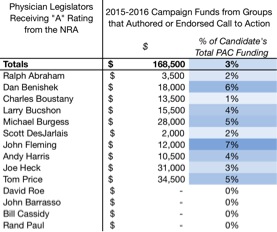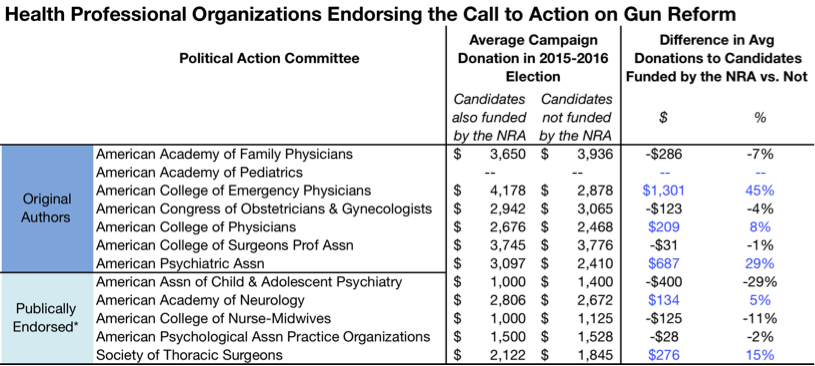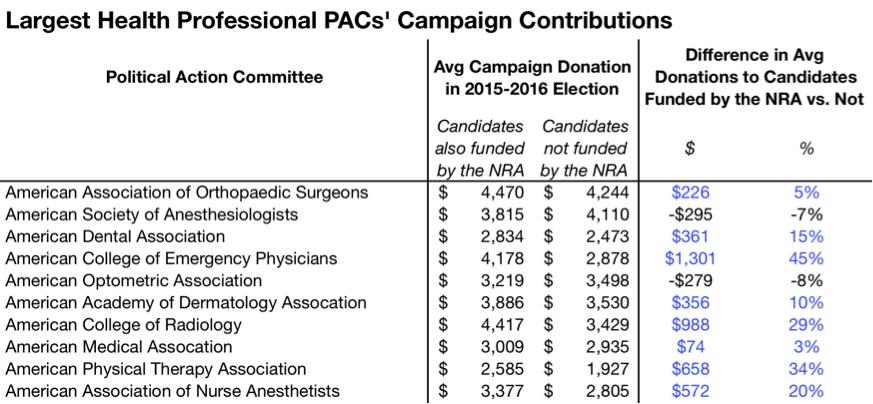Last Sunday, Orlando was home to the most fatal mass shooting in American history. The gunman, Omar Mateen, opened fire early Sunday morning at Pulse nightclub, killing 49 people and wounding 53 more. This sickening tragedy marks the 133rd mass shooting in 2016 so far, meaning this year has born witness to nearly as many mass shootings as days.
Health professional organizations have echoed the cries of our president, our media, and our citizens that we must do better — that we cannot accept these senseless tragedies as the norm. Last year, a cohort of health professional organizations wrote a call to action, advocating for the implementation of specific measures to reduce firearm injury and mortality. In it, they drew upon the “first-hand experience” physicians have treating victims of gun violence as well as the public health nature of the problem as justification for their authority in promulgating recommendations. More than two dozen additional groups — mostly other health professional organizations — quickly endorsed their call.
Words are a powerful thing. They can galvanize, inspire and enrage. They can draw tears, induce guilt and light a fire under even the most complacent. But, words coupled with action are far, far more meaningful.
Earlier this year, I wrote about physician legislators’ dismal track record on gun violence. All of the current Republican physician policy makers were given “A” ratings by the NRA, and most voted against universal background checks — a common sense gun regulation that is broadly supported by most American citizens and has been shown to save lives. I was dismayed, though not surprised, to see that almost all of these physician legislators received campaign funding from the NRA. I was surprised, however, to see that these men also received campaign funding from the political arms of the very health organizations that wrote the firearms call to action. Each of these legislators have received, on average, $12,000 from these organizations this election season, amounting to roughly three percent of their total funding from PACs.
Source: Open Secrets
I decided to broaden my investigation, and found that many of the organizations authoring or endorsing an emphatic call to arms against firearm injury were not just funding physician legislators who were rated “A” by the NRA, but many other pro-gun legislators as well. The table below takes the PACs affiliated with these organizations and compares their average campaign donations to candidates funded by the NRA versus average campaign donations to candidates not funded by the NRA. While not a perfect proxy, it seems reasonable to assume that the NRA funds, by and large, candidates with pro-gun track records who typically oppose the kinds of firearms regulations proposed by many health professional organizations.
Around half of organizations endorsing the call to action on gun reform have donated more on average this election season to NRA-funded candidates — including the American College of Emergency Physicians, American College of Physicians, American Psychiatric Association, American Academy of Neurology and the Society of Thoracic Surgeons.
*Not all of the organizations that publicly endorsed the 2015 Call to Action had affiliated PACs, so I did not include them in the table. Sources: Open Secrets reports all PAC contributions to federal candidates. I simply compared health professional organization funding for candidates also funded by the NRA to those that received no NRA funding.
Let’s take the American College of Emergency Physicians (ACEP), an organization that has publicly and unequivocally asserted that they “abhor the current level of intentional and accidental firearm injuries.” In a 2013 policy statement, they highlight support for a broad range of efforts to tackle the gun violence epidemic, including universal background checks, restriction of the sale and ownership of weapons designed for military use and increased funding for firearm safety and injury prevention research.
As is common for health professional organizations, the American College of Emergency Physicians has an associated PAC. This PAC has the stated goals of funding “pro-emergency medicine candidates who will consider the issues that are important to [emergency room physicians and their] patients.” Yet, despite the ACEP’s clear and emphatic stance advocating for increased gun regulation, their political arm has already donated $422,000 to candidates running in the 2015-2016 election cycle who have also received campaign funds from the NRA. This is close to double the total amount they have given candidates who have not received any NRA funding. On a candidate-by-candidate basis, the ACEP has given an average of $4,200 to these pro-gun candidates, versus $2,900 to candidates receiving no NRA support.
These dollars have an impact. A 2010 story on the AECP website broadcast the organization’s pivotal role in electing Representative Jeff Duncan into an open seat in South Carolina, both directly through financial contributions and indirectly by mobilizing the American Medical Association’s (AMA) political support. The NRA also enthusiastically endorsed Rep. Duncan in 2010, citing his “perfect pro-gun voting record” and co-sponsorship of bills rolling back gun regulations in the South Carolina state house as rationale for their “A” rating. Duncan has since emphatically and publicly come out against some of the key recommendations delineated in the AECP’s 2013 policy statement, writing on Facebook that “expanded background checks and gun show requirements would have had NO effect on stopping Aurora, Sandy Hook or Tucson. Nor would they have any effect on the violent gun-crime in Chicago.” During his tenure in the house, Duncan has cast his ballot in a manner consistent with his NRA endorsement, voting for legislation that prohibits the District of Columbia from using federal funds to regulate gun possession and for a bill requiring states that authorize concealed firearm carry to honor concealed carry permits issued by another state.
The AECP PAC is not alone in their preferential financial support of pro-gun candidates. The American Psychiatric Association’s president issued a statement in January 2016 asserting support for “expanding background checks” and addressing gun violence as a public health problem. And yet like the AECP PAC, the American Psychiatric Association’s PAC has given more this election cycle, both in total dollars ($111,500 vs. $92,500) and on a candidate-by-candidate basis ($3,100 vs. $2,400), to candidates funded by the NRA than to those that are not.
Broadening the scope even further beyond the organizations authoring the call to action, eight of the ten largest PACs affiliated with health professional organizations contributed more money, on average, to candidates funded by the NRA. Of note, this includes the American Medical Association, who, in the wake of the Orlando attacks, described gun violence as a “public health crisis” and announced they would begin actively lobbying Congress to overturn legislation keeping the Centers for Disease Control and Prevention (CDC) from researching gun violence. In their memo, the AMA highlights specific support for waiting periods before purchasing firearms and universal background checks for all handgun purchases. However, in this election season alone, they have contributed close to $275,000 in total to candidates who are also funded by the NRA — around 10 percent more than they have contributed to candidates not funded by the NRA.
This discrepancy between the stated public health agendas of these organizations and the financial actions taken by their political arms is jarring, to say the least. Now, I’m not suggesting that these organizations are purposefully sabotaging their public health axis. Of course, these PACs don’t make funding decisions based solely on a legislators’ stance on gun regulation. They have a broad range of legislative priorities that range from medical liability reform to physician payment reform to patient safety and quality of care issues and beyond.
Still, when physicians’ political actions directly undermine their clinical goals, it ought to give us pause. Given the gravity of the gun violence problem in this country, and the weight of the moral and professional obligation physicians have in helping to tackle it, it feels ethically dubious to continue to support pro-gun legislators — regardless of whatever other pro-physician policies they bring to the table.
This dynamic — where physician political action groups financially support candidates who oppose their own stated public health goals — has happened before. In 1999, Joshua Scharfstein, a then-resident at Boston Medical Center, reported that the AMA’s political action committee (termed AMPAC) gave nearly three times as much to senators who helped kill a proposal that would have increased cigarette taxes and granted the Food and Drug Administration (FA) authority to regulate tobacco. Scharfstein asked, “Why does a group that represents 250,000 physicians preferentially fund the supporters of an industry that annually kills 400,000 Americans?” When confronted with their record on tobacco, AMA leaders argued, “contrast[ing] public health goals and AMPAC contributions is ‘to compare not apples and oranges but apples and hippopotamuses.’”
I respectfully disagree. Health professional organizations draw their credibility and authority in the policy sphere from an unwavering dedication to the health of the public. By giving to candidates that block the very recommendations these organizations emphatically and publicly promote, they are both undermining this credibility and the health of their patients they seek to promote.
What Can We Do About It?
If you donate to a physician-related PAC, look to see whose campaigns they are funding. Check out the candidates’ stances on gun regulations here. I am also happy to share my raw data cross-referencing the politicians that the NRA funds with those that different health professional organizations fund if you’d prefer to use that metric. If this funding situation strikes you as wrong, reach out to your organization and ask them to consider putting their money where their proverbial public health mouth is, and withdrawing support from candidates that actively oppose common sense gun regulations.





